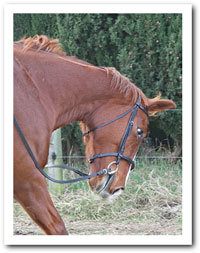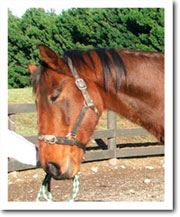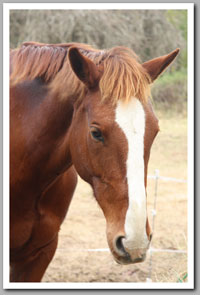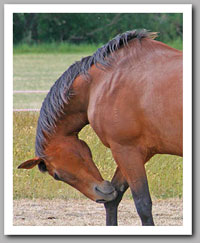Head Flicking & Associated Problems
In these cases the mineral imbalances and sometimes toxins are affecting the central nervous system in general (as in Staggers) or specific nerves in the horse’s body (the trigeminal nerve in head-flicking/shaking horses, and the sciatic nerve in the case of stringhalt).
They all respond to the same treatment regime only you have to be very particular and follow the Recommended Steps to the letter!
These conditions affecting the nerve cells take longer to return to normal than if the problem is muscular; expect anywhere from 1-3 months especially with horses who are head-flicking, (known as Head Shaking overseas) and longer in the case of stringhalt.
Have You Diagnosed Correctly?

Head-shaking/flicking is characterized by some or all of the following:
- Sudden, involuntary jerking up and down of the nose (exactly like a bug has flown up his nose)
- Sometimes it is more a violent shaking of the ears
- Hanging the ears out to the side (aeroplane ears)
- Urgent rubbing of their nose on their leg, or dragging it along the ground, (sometimes forgetting they were cantering at the time!)
- Leaping around trying to ‘box’ their nose with their front feet
- Pressing their head into you
- General distress and agitation
- Urine pH over 8
There are a variety of conditions that will ‘trigger’ head-shaking episodes.
- ‘Sunlight’ in which case the horse can be described as ‘photophobic’
- Other UV rays (on cloudy days)
- Breeze/wind
- Flying insects in the grass
- Exercise
- Stress/adrenaline (anything that gets their ‘gander up’)
- Rye-grass
- Clover
- Lucerne (or alfalfa)
Important: Head-shaking/flicking is not ‘naughty’ behavior. Forget trying to physically restrict the horse with any kind of ‘tie-down’or trying to ‘school’ him out of it. It is a debilitating, painful condition, see below.
The Trigeminal Nerve
It has been established that head-shaking/flicking involves the malfunctioning of the trigeminal nerve in the horses head.
The trigeminal nerve originates behind the horse's eye and has branches down to the mouth, nostrils and up to the ears. When this nerve is surgically 'cut' or 'blocked' the symptoms immediately cease. The trouble is, people who have had the nerve block done say the process caused extreme pain and distress and they would never put a horse through it again.
and has branches down to the mouth, nostrils and up to the ears. When this nerve is surgically 'cut' or 'blocked' the symptoms immediately cease. The trouble is, people who have had the nerve block done say the process caused extreme pain and distress and they would never put a horse through it again.
And, in the case of cutting, the nerve eventually heals up to some extent after which symptoms are much worse. In the meantime the surgery can cause the horse to have a 'droopy lip'. So neither nerve blocking or cutting are viable or humane options!
Humans with trigeminal nerve trouble describe 'sharp, electric shock sensations' in their face. It is an excruciatingly painful condition that drives some people to suicide. Even if head-shaking/flicking were only half as bad, it warrants urgent action.
Click for
Ten Steps to Reverse Head-shaking/flicking
Globally, there are various theories on what causes head-shaking/flicking but no real progress has been made in finding a ‘cure’.
Some maintain their head-shaking/flicking was caused by vaccinations. This may be so but not in New Zealand where the condition is epidemic amongst horses that have never been vaccinated.
Some say it is caused by stressful events. This theory doesn’t sit right because horses are prey animals and you can’t get much more stressful a situation than being eyed up as a predator’s meal! If this was true then head-shaking/flicking would be observable in wild herds which it is not.
On first glance it appears to affect horses somewhat randomly and there is no apparent pattern, hence the term ‘idiopathic’.
Many treatments have been tried over the years with limited and varying success. Everything from nose nets, masks, contact lenses, melatonin, spirulina, drugs such as cyproheptidine, or Dexamethasone Pulse Therapy.
Until now, the prognosis has NOT been good for head-shaking/flicking horses. Often, after a lot of money has been spent to no avail, these horses are retired and turned out on pasture, only to get worse. Then, eventually when their distressed owners see them flinging around the paddock, banging their head on the side of the water-trough or plunging their head in and out of the water or trying to stuff their head in the hedge to avoid the light, they are understandably put down.
A Simple Cause?

This horse shows the classic 'zonked out' look with earoplane ears of a horse with a headache.
Is it Possible There Could be a Very Simple Cause?
The evidence is accumulating that head-shaking/flicking is another physiological problem and is likely the result of consuming a chronically high potassium diet (re-growth grass, clovers, Lucerne/alfalfa, molasses) exacerbated by pasture ‘spikes’ of both potassium and nitrogen which occur seasonally in the warm, wet, or cool, wet, cloudy or frosty conditions.
Why head-shaking/flicking is ‘seasonal’.
Symptoms are noticeably worse in spring, autumn and sometimes other times of the year, depending on the weather. People often report their horses are worse after rain, consecutive cloudy days or frosts. This is because grass needs these elements (potassium and nitrogen) for growth and therefore sucks them up at every opportunity. Both are readily taken up into the plant with water after rainfall and tend to accumulate when temperatures are too cold for growth.
These spikes, or changes in the bio-chemistry of the  grass, happen especially when you have rye-grass and clover or any species of grass that has been stressed by drought, frosts or over-grazing, when it is in rapid growth mode or when it has been fertilised to increase production.
grass, happen especially when you have rye-grass and clover or any species of grass that has been stressed by drought, frosts or over-grazing, when it is in rapid growth mode or when it has been fertilised to increase production.
Read and follow to the letter:
Ten Steps to Reverse Head-flicking
Associated Symptoms
Head-flicking horses usually exhibit other symptoms as well
- Musculo-skeletal issues of being twitchy and touchy
- Sacro-iliac problems of not being able to canter properly
- Metabolic disorders such as insulin resistance
- Bouts of colic.
We know they all stem from the same cause because when you remove this cause and address the diet ALL these symptoms go away.
Head Shyness
This is very closely related to head-flicking. It is where different nerves are affected; those up around the ears and fortunately responds to the very same feeding regime.
Read An ‘Ear-Shy’ Horse No More
This story contains video clips which illustrate the condition.
The important thing to understand is that it is not that the horse has been abused in the past. Far from it: it is a diet related issue and simply goes away when you make the Recommended Diet Changes.
Very Important: Never tie horses up when they are touchy around the ears as they are prone to violent pulling back. They can be dangerous and liable to hurt themselves and you.
Once they are back to normal you will be able to tie them again no problem. Don’t make an issue when there really isn’t one!!
Salt Changed Our Lives: Reggie’s Head-Shaking Story
Hi Jenny,
I’m so sorry it’s taken me so long to get back to you!
It’s been just over a year now since I started supplementing salt straight in Reggie’s bucket feeds and it has completely changed our lives! We’re now hacking out, doing jumping, dressage, everything, all without a nose net, and he is no longer headshaking! My teenage daughter is now able to take him out to lessons at her riding school, and last week they went to their first ever one-day event – something I thought was impossible a year ago!
Thank you again so very much for putting the info out there – it really has changed Reggie’s life and it feels like I’ve got my lovely mellow horse back!
Re. your questions – I think the thing that triggered Reggie’s headshaking was moving from home to a livery yard where he was on heavily fertilized grazing and being fed heavily fertilized rye grass hay – at the time I thought the hay looked beautiful, so rich and green! Completely different to the poor looking unfertilized meadow hay he’d been getting up til then!! If only I’d known how damaging it was! He started headshaking within 2 months of arriving at the new yard back in winter 2009, then gradually got worse and worse until we were able to move him to our new farm in September 2012… At that point we put him on a track system, and the hay/grass was organic unfertilized meadow with lots of varieties of native plants… I had our hay analysed and put them on a forage-based mineral diet (with Magox, calcium, zinc, copper, vit E etc.), hoping this would improve his headshaking… but sadly saw no change as I guess the potassium/sodium imbalance had gotten so bad – it was only when I saw your site and started adding extra salt that he started to show a dramatic improvement within a month … it’s now been just over a year and he is a different horse! I honestly cannot thank you enough!!
… it’s now been just over a year and he is a different horse! I honestly cannot thank you enough!!
Here is a photo of Reggie and my daughter out at their 1-day event last week! They had a fantastic time and Reggie was wonderful and so calm and mellow – this wouldn’t have been possible without your help!
Best wishes, and a million thanks!!
Rachael
'I had just finished reading your '10 Steps to reversing Head Flicking' on your 'Calm Healthy Horses' website and noted you advised we could email you for support. Support is exactly what I needed as I was at my wits end.
I have a 15 year old Thoroughbred who developed a head flick three years ago.
My vet recommended the net over his nose and this had been working well. Unfortunately this spring he got really bad and it looks as if I'm going to have to take extreme measures to bring him right.
I had been using the nose-net during spring/summer and autumn but noticed he didn't really need it over winter. However this spring he became particularly agitated and the head flicking got worse even with the nose-net.
Enter the Calm Healthy Horses team...
After advice from Nina & Jenny I started adding salt to his feed along with GrazeEzy.
 Within a week he was a much calmer horse and the best he has ever been in temperament. He has gone from being too agitated to ride at all to being OK to ride again with the nose-net, all the while still on the grass as I don’t have the facility to get him off it
Within a week he was a much calmer horse and the best he has ever been in temperament. He has gone from being too agitated to ride at all to being OK to ride again with the nose-net, all the while still on the grass as I don’t have the facility to get him off it
Angela, Tauranga
More Successes with Head Flickers...
 Calm Healthy Horses
Calm Healthy Horses